Key takeaways:
- Respect and acknowledgment of opponents are essential in creating a supportive and positive atmosphere during breakdancing battles.
- Fair competition relies on agreed-upon rules and equal opportunities for participants, fostering unity and trust within the community.
- A positive attitude toward competitors enhances the experience and encourages growth and camaraderie among dancers.
- Mutual support and sportsmanship can significantly elevate the morale and energy of both participants and audiences during battles.
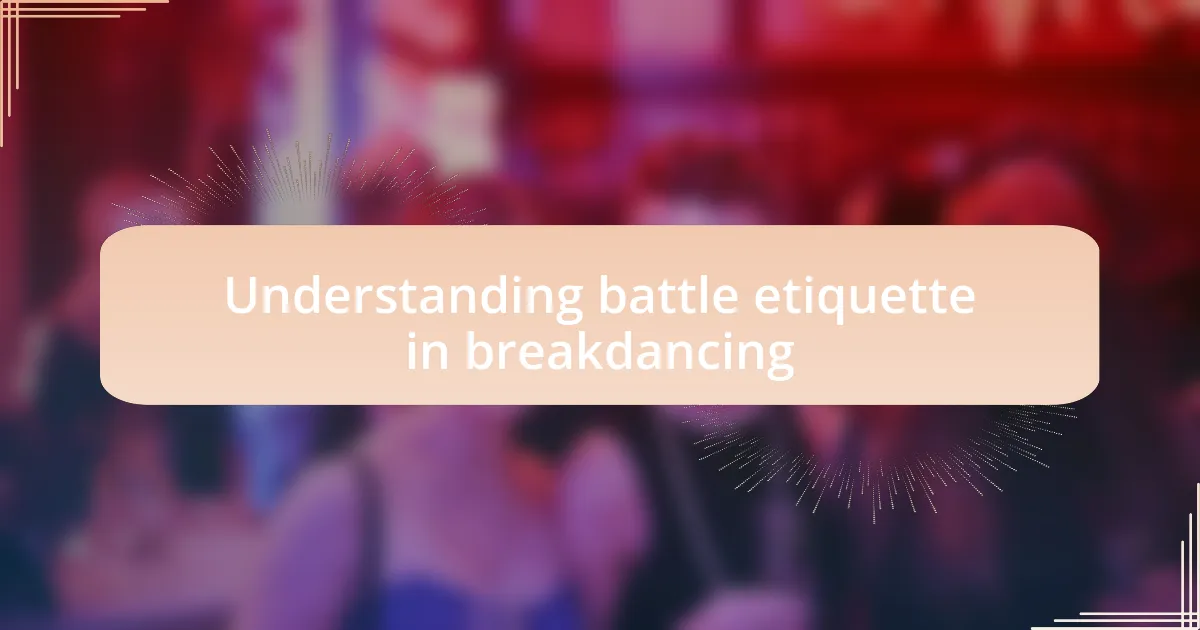
Understanding battle etiquette in breakdancing
Understanding battle etiquette in breakdancing is crucial for fostering respect and camaraderie among b-boys and b-girls. I remember my first battle; I was nervous, but observing the seasoned dancers showed me the power of respect. They’d approach each other with nods and smiles, creating an atmosphere where competition felt more like a shared celebration of creativity.
One essential aspect is acknowledging your opponent. When they’re in the spotlight, it’s vital to give them space to express themselves. I often find myself thinking, how would I feel if someone interrupted me mid-move? It’s a simple act, but it speaks volumes about your character as a dancer and a person in the community.
Moreover, the right attitude can set the tone for the entire event. I once participated in a battle where the vibe was electric, thanks to everyone’s mutual respect. It was a reminder that battles aren’t just about winning; it’s about learning, evolving, and leaving each other inspired. When we embrace this etiquette, we elevate the art form together.
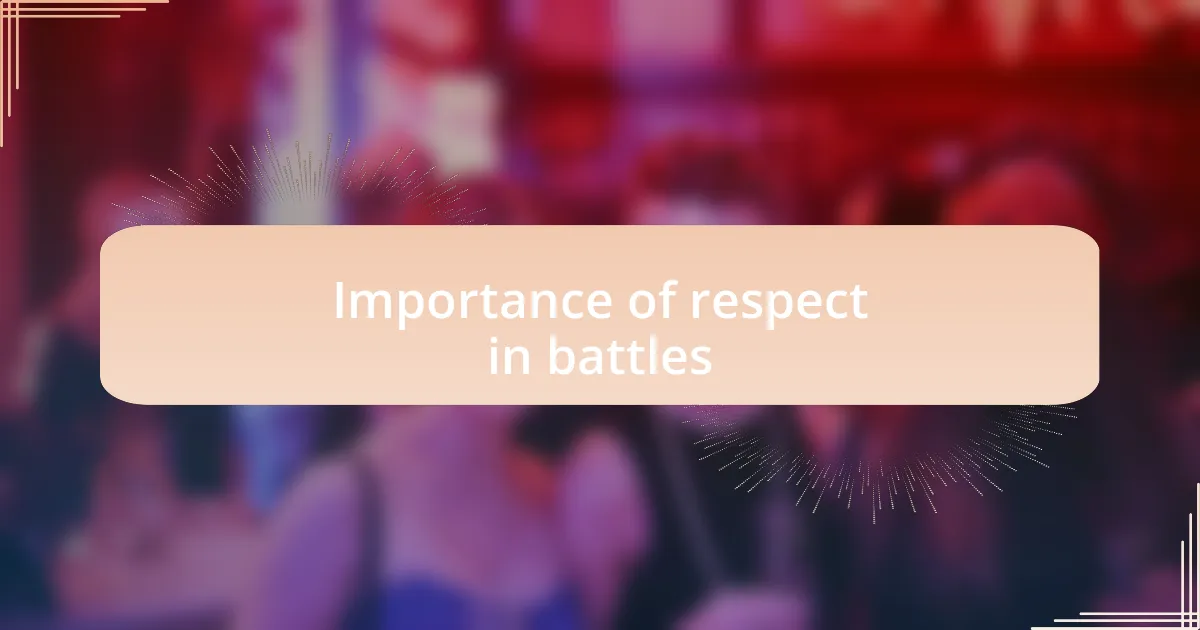
Importance of respect in battles
Respect plays a pivotal role in breakdancing battles, shaping not only the competition but also the community spirit. I recall a moment during a heated battle when a dancer unexpectedly fell. Instead of laughing or taking advantage, everyone, including me, paused and showed concern. That moment highlighted how respect transforms competitors into a supportive circle, all concerned with each other’s well-being.
Additionally, I often reflect on how respect deepens our connections. After a particularly fierce battle, I approached my opponent, acknowledging their fierce moves and solid footwork. That simple exchange became a foundation for a friendship, emphasizing that while we compete, we’re also part of a larger family. This sense of community is what inspires many of us to push our limits.
Furthermore, the energy of respect resonates throughout the entire event. I remember listening to the crowd cheer not just for impressive moves but also for those moments of mutual acknowledgment. It’s exhilarating to see the audience respond positively when dancers interact with respect. This reinforces the idea that battles are more than just competitions; they reflect our values as individuals and as dancers.
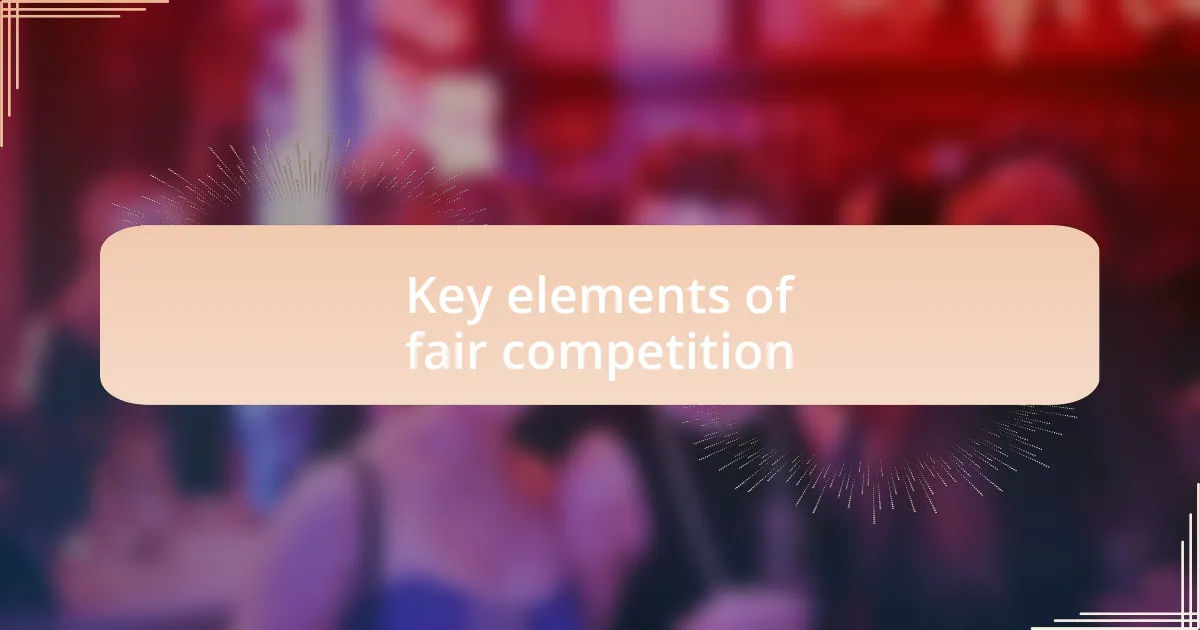
Key elements of fair competition
In fair competition, clear and agreed-upon rules are essential. I remember my first battle where the guidelines were laid out, and it created a level playing field for everyone. It felt good to know that each dancer would be judged on the same criteria, allowing us to showcase our skills without confusion or bias.
Equal opportunities for all participants is another fundamental aspect. I once participated in a battle where the organizers made sure every dancer had equal time to perform. It struck me that this not only highlighted our unique styles but also fostered a sense of unity among competitors. Have you ever been in a situation where you felt marginalized? It’s in those moments that fairness becomes crucial.
Judges play a significant role in ensuring the integrity of the competition. I’ve experienced battles where judges were not only knowledgeable but also respected within the community. Their presence added an element of trust; we all knew they valued our craft and judged fairly. It makes me wonder how often we think about who’s behind the judging panel, and how their credibility can influence our perceptions of fairness in competition.
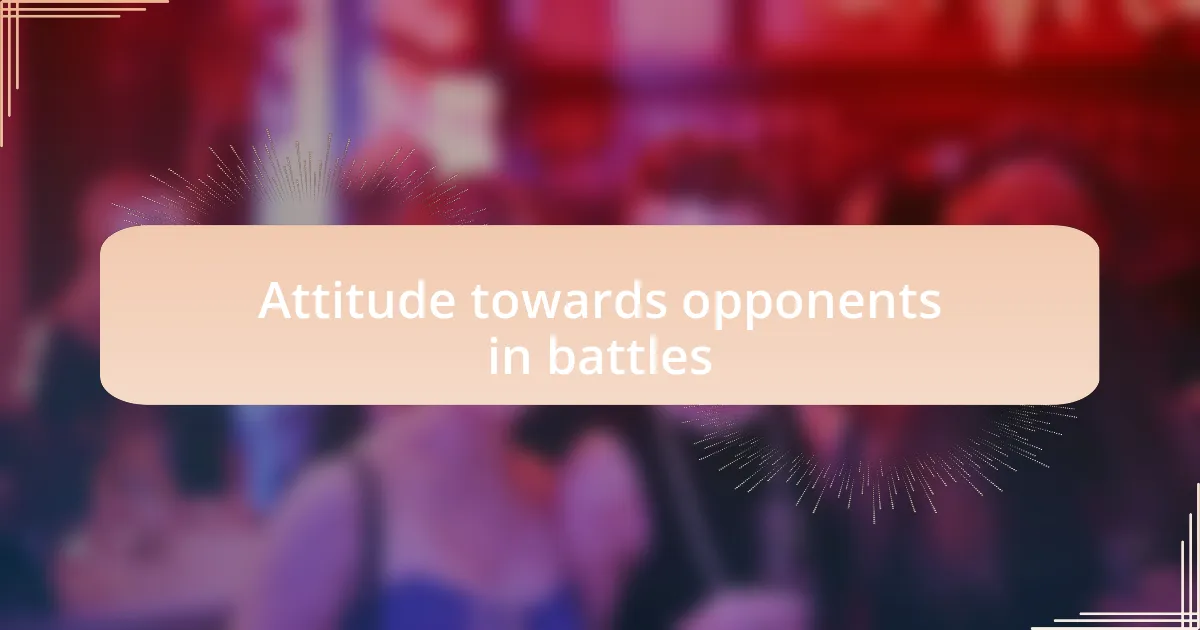
Attitude towards opponents in battles
When it comes to battles, the way we view our opponents can make a world of difference. I remember a battle where my competitor looked me straight in the eye before we danced. It wasn’t just a challenge; it was a mutual respect that fueled our performances. Have you ever felt that connection with a rival? I think those moments elevate the entire experience, reminding us that we’re all part of a greater creative landscape.
A positive attitude toward opponents fosters a healthier environment for everyone involved. There was a time when I clashed with a dancer known for their fierce style. Instead of feeling threatened, I found myself inspired. I realized that appreciating what others bring to the floor not only pushes me to improve but also strengthens the community. Can we really grow without acknowledging the talent around us?
In battles, maintaining respect, even in competition, speaks volumes about our character. I once was part of a heated showcase where we both went all out, yet afterward, my opponent offered a compliment on my moves. That gesture reminded me that it’s possible to compete fiercely while supporting one another. Why not celebrate each other’s skills? After all, it’s the passion for breakdancing that brings us together, isn’t it?
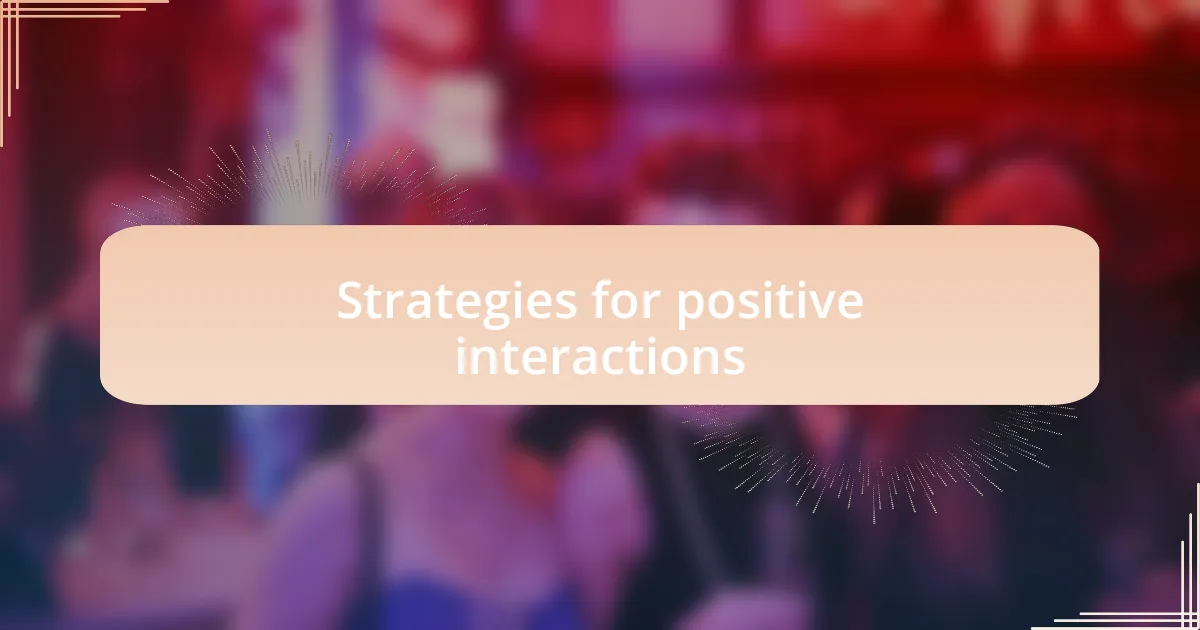
Strategies for positive interactions
Establishing a friendly vibe before a battle can set the tone for positive interactions. I remember walking up to a battle, exchanging smiles and nods with my opponents. In that moment, any tension evaporated, and we were all there to share our love for breakdancing. How often do you think a simple exchange can change the dynamics of an entire event?
Active listening is another powerful strategy. During a judging feedback session, I once asked a fellow dancer about their thoughts on my performance. Their willing guidance not only improved my skills but also deepened my connection with them. I found that genuine curiosity about others can lead to lasting relationships, creating a tighter-knit community. Have you ever noticed how sharing experiences can foster bonds?
Encouraging each other post-battle can uplift the entire atmosphere. After a challenging round, I took a moment to congratulate my opponent for their creativity. The smile they gave in return was priceless; it was a reminder that battles aren’t just about victory but about celebrating artistry. Why not embrace every opportunity to uplift others? After all, it’s this sense of camaraderie that enriches our journey in the breakdancing world.
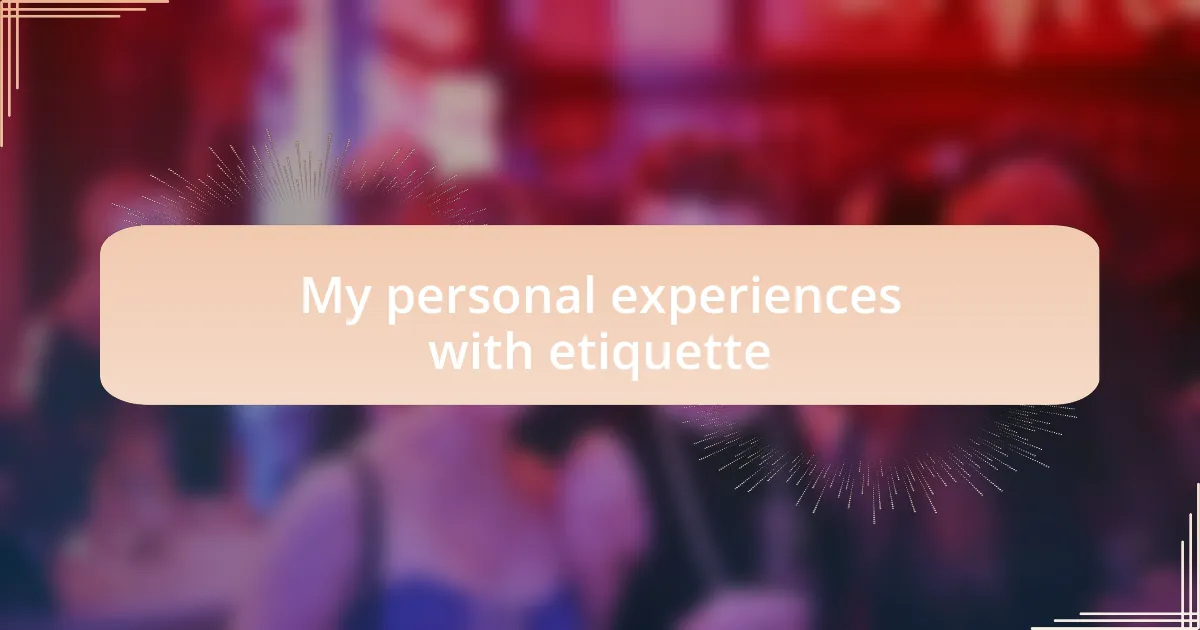
My personal experiences with etiquette
In my early days of battling, I quickly realized that showing respect was just as vital as showcasing my skills. I vividly recall a competition where my opponent wiped the sweat from his brow after an intense round and gave me a nod of approval. That moment made me reflect: how can a small gesture convey such respect and recognition in our art?
There was one time I saw a dancer refuse to shake hands post-battle after losing. The awkwardness was palpable, and it made me think about how etiquette can impact the vibe of a battle. I remember feeling a surge of empathy, realizing that everyone experiences highs and lows; we must embrace humility and grace, even in defeat. It’s clear to me that maintaining a respectful atmosphere is crucial for our community.
During another battle, I made an effort to encourage not just my fellow competitors but also the youth in the audience. I shared my journey with them afterward, explaining that each interaction counts, and I felt their energy shift in response. Isn’t it powerful how reinforcing positive behavior can inspire others? Those moments reaffirmed my belief that etiquette in battles isn’t just about rules; it’s about creating a culture that nurtures creativity and connection.
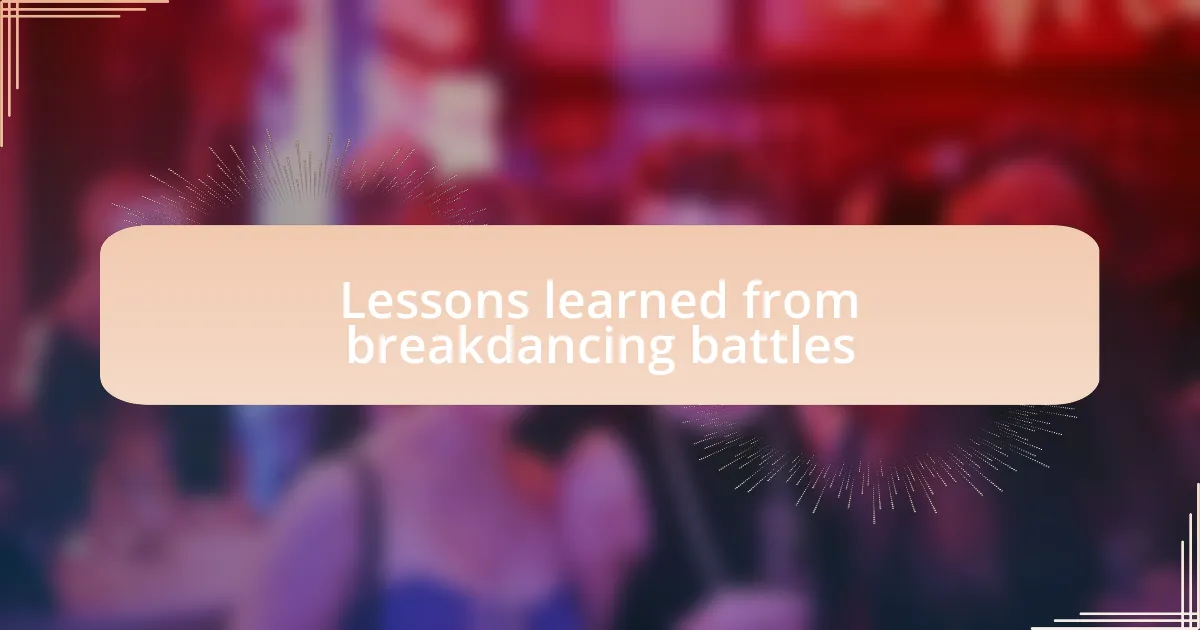
Lessons learned from breakdancing battles
Witnessing the camaraderie among dancers during battles often teaches me that victory isn’t everything. I recall a particular event where a rival dancer, after an intense round, took a moment to encourage me by saying, “Your style is fire!” His words lit a spark in me, showing that even in competition, mutual support can elevate everyone’s game. How often do we remember those who lift us up rather than just the trophies?
Another lesson from the battles is about the power of presence. I’ve been in situations where a dancer, regardless of their skill level, commanded the room simply by exuding confidence and positivity. I once performed my routine, and instead of focusing on the outcome, I poured my energy into connecting with the audience. That experience taught me that the emotional landscape of a battle can be just as significant as technical precision. Isn’t it fascinating how shared energy can amplify our experiences?
The importance of sportsmanship cannot be overstated. During one memorable competition, another breaker, after an exhilarating challenge, congratulated me with genuine enthusiasm despite being eliminated. This simple act left a lasting impression on me. It reinforced the idea that how we respond to wins and losses shapes not only our individual character but also the community as a whole. Doesn’t it make you think about the legacy we’re building through these battles?